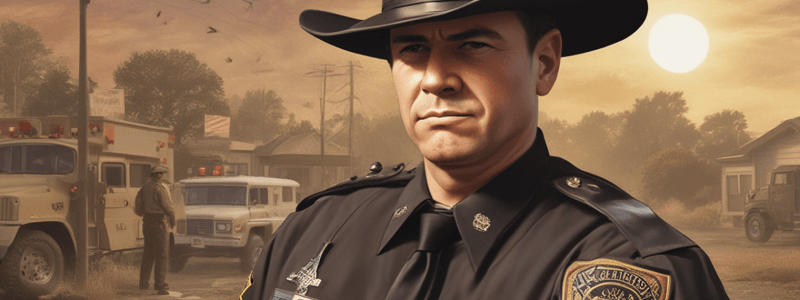Podcast
Questions and Answers
What is the protocol for handling news media complaints initiated by Sheriff's Office personnel?
What is the protocol for handling news media complaints initiated by Sheriff's Office personnel?
- The complaint is ignored and not addressed
- A documented inter-office memorandum is forwarded to the Sheriff (correct)
- A lawsuit is filed against the news media organization
- A verbal warning is given to the news media representative
Who is responsible for referring news media requests for information to?
Who is responsible for referring news media requests for information to?
- Any available supervisor
- The arresting or investigating deputy
- The Sheriff personally
- The Public Affairs Office (correct)
What is the reason for denying news media requests for information?
What is the reason for denying news media requests for information?
- To protect the Sheriff's Office from negative publicity
- To avoid giving information that could hinder an investigation
- Privacy rights, safety of a defendant, witness, or victim, or other legal factors (correct)
- To preserve evidence for a future trial
What should members of the Sheriff's Office who lack confirmed knowledge of the facts do when approached by news media?
What should members of the Sheriff's Office who lack confirmed knowledge of the facts do when approached by news media?
Who may refer complaints to the Professional Standards Section, Legal Division, or other component for investigation and recommendation?
Who may refer complaints to the Professional Standards Section, Legal Division, or other component for investigation and recommendation?
What is the purpose of documenting news media complaints in an inter-office memorandum?
What is the purpose of documenting news media complaints in an inter-office memorandum?
Who is responsible for resolving problems that arise between news media representatives and members of the Sheriff's Office?
Who is responsible for resolving problems that arise between news media representatives and members of the Sheriff's Office?
Why should arresting or investigating deputies avoid making statements to the news media?
Why should arresting or investigating deputies avoid making statements to the news media?
What type of information should not be disclosed to the public?
What type of information should not be disclosed to the public?
Who is responsible for notifying the Public Information Office in the event of a serious incident?
Who is responsible for notifying the Public Information Office in the event of a serious incident?
What is the purpose of the Public Information Office?
What is the purpose of the Public Information Office?
Under what circumstances can news media representatives take photographs or videos on private property?
Under what circumstances can news media representatives take photographs or videos on private property?
Who can release details of an administrative investigation to the news media?
Who can release details of an administrative investigation to the news media?
When can news media representatives access the scene of an incident?
When can news media representatives access the scene of an incident?
What type of information should be protected to prevent a suspect from fleeing or avoiding apprehension?
What type of information should be protected to prevent a suspect from fleeing or avoiding apprehension?
Who is responsible for taking protective measures to prevent the photographing or televising of a body?
Who is responsible for taking protective measures to prevent the photographing or televising of a body?
When can the identity of a victim or witness be disclosed to the public?
When can the identity of a victim or witness be disclosed to the public?
What type of incidents require notification of the Public Information Office?
What type of incidents require notification of the Public Information Office?
What determines the guidelines and control the release of information in federally controlled investigations?
What determines the guidelines and control the release of information in federally controlled investigations?
What type of information can be released to the media regarding an incident?
What type of information can be released to the media regarding an incident?
What information is not to be released to the media regarding a criminal case?
What information is not to be released to the media regarding a criminal case?
Who is responsible for releasing information to the media regarding an arrest?
Who is responsible for releasing information to the media regarding an arrest?
What information is not to be released to the media regarding a suspect prior to arrest?
What information is not to be released to the media regarding a suspect prior to arrest?
What information is to be released to the media regarding an arrest?
What information is to be released to the media regarding an arrest?
What is the purpose of releasing information to the media regarding an investigation?
What is the purpose of releasing information to the media regarding an investigation?
What type of information is exempt from disclosure pursuant to Florida or Federal Law?
What type of information is exempt from disclosure pursuant to Florida or Federal Law?
What information is to be released to the media regarding a crime victim?
What information is to be released to the media regarding a crime victim?
What is the purpose of not releasing certain information to the media?
What is the purpose of not releasing certain information to the media?
Flashcards are hidden until you start studying
Study Notes
News Release and Media Cooperation
- News Media complaints initiated by Sheriff's Office personnel shall be documented in an inter-office memorandum and forwarded to the Sheriff.
- If the Sheriff concurs, a letter shall be sent to the individual's employer citing the specific violation.
- Resolutions between the Sheriff's Office and the News Media representatives will be made on a case-by-case basis.
Problems with News Media Representatives
- Problems arising between News Media representatives and members of the Sheriff's Office shall be referred to the deputy in charge, a supervisor, and/or the Public Affairs Officer, or designee.
Withholding Information
- When News Media requests for information are denied, the denial shall be based on:
- Privacy rights
- Safety of a defendant, witness, or victim
- Other legal factors
Arresting or Investigating Deputies
- Deputies who are likely to be primary prosecution witnesses in a criminal case shall avoid making statements to the News Media about information that would normally be given in a deposition or at trial.
Referring Inquiries
- Any member of the Sheriff's Office who does not have confirmed knowledge of the facts shall assist the News Media by referring the inquiry to the Public Affairs Office, providing the name and phone number of the individual to be contacted.
Media Requests for Investigative Information
- Media requests for investigative information shall be referred to:
- Public Affairs Office personnel
- The supervisor in charge of the investigation
- Their designee
Federally Controlled Investigations
- In federally controlled investigations, the federal agency involved will determine guidelines and control the release of information, if any.
Release of Investigative Information to Media
- The following investigative information may be released to the media:
- General type or suspected nature of an incident
- General location, date, and time
- Injuries sustained, damages, and a description of how the incident occurred
- Amount and type of property taken
- Identity and general address of certain victims
- Name, age, address, and booking photographs of adults charged with a crime
- Names, addresses, and booking photographs of juveniles who have been taken into custody for a felony offense
- Criminal records of adults and Hillsborough County criminal records of juveniles charged with a felony
- Requests for aid in locating evidence, a complainant, or a suspect
Investigative Information Not to be Released to Media
- The following investigative information shall not be released to the media:
- Investigative techniques
- Names, photographs, or video recordings of undercover or special investigation deputies/detectives
- Identity of any victim of a crime or relatives of crime victims
- Confidential juvenile arrest information related to misdemeanor charges
- Identity of any critically injured or deceased person prior to notification of next of kin
- Specific cause of death until determined by the Medical Examiner
- Investigative information and information of an evidentiary nature regarding a criminal case
- Contents of suicide notes
- Unofficial statements concerning Sheriff's Office personnel or internal affairs matters
- Home address and phone numbers of members of the Sheriff's Office
- Valuables or cash overlooked by crime perpetrators
- Amount of money taken in a robbery or embezzlement of a financial institution or savings and loan association
Arrest Information to be Released
- The following arrest information may be released to the media:
- Accused's name, age, description, residence, employment, and marital status
- Substance or text of the charge as contained in an affidavit, warrant, indictment, or information
- Identity of the investigating and arresting deputy and the length of the investigation
- Circumstances immediately surrounding the arrest
- Amount of bond set
- Criminal Report Affidavits shall be open to media inspection
Arrest Information Not to be Released
- The following arrest information shall not be released to the media:
- Identity or location of any suspect prior to arrest
- Results of any investigative procedure
- Information which, if prematurely disclosed, would significantly interfere with an investigation or apprehension
- Identity of a prospective witness
- Identity of a victim/witness if such disclosure would prejudice an investigation to any significant degree
Direct Access by Media Personnel
- Direct access by media personnel shall be allowed only after all known evidence has been processed and the on-site investigation has been completed.
Photography and Videotaping
- News Media must obtain permission from owners or their representatives when photographs, films, or video tape are to be taken on private property.
- In public places, News Media representatives shall be allowed to freely photograph, film, or videotape at the scene of any incident so long as their activity does not interfere with an investigation.
Administrative Investigations
- Sensitive information and the identity of deputies involved in an administrative investigation shall not be disclosed except by express permission of the Sheriff, or designee.
- The release of administrative investigations shall conform to Florida Law.
- Details of an administrative investigation may be released to the News Media only after the case has been closed.
- Administrative investigations are to be released to the media only by the Sheriff, or designee, or a Professional Standards Section supervisor, or a Public Affairs Officer.
Notification of Public Information Office
- The Public Information Office shall be notified in the following situations:
- Serious injury or death involving or caused by a deputy
- Jail incidents resulting in serious injury or other jail problems that may be of public interest
- Escaped prisoner
- Hostage/barricade situations
- Explosive ordnance (major incidents involving explosive violence)
- Disaster situations
- Significant events of public interest, including but not limited to homicide, suicide, serious bodily injury, violent crimes, etc.
Public Information Office Responsibilities
- The Public Information Office shall be responsible for information gathering, preparation, and dissemination to news media representatives during times of extreme emergencies such as hurricanes or other potential catastrophic events.
- The Public Information Office shall be notified in a timely fashion by the supervisor of the investigating district/division when a major crime or catastrophic events require on-site liaison and coordination for the dissemination of information to news media representatives.
Studying That Suits You
Use AI to generate personalized quizzes and flashcards to suit your learning preferences.



